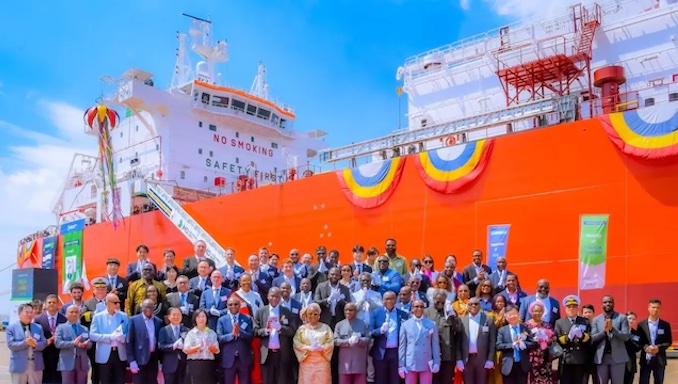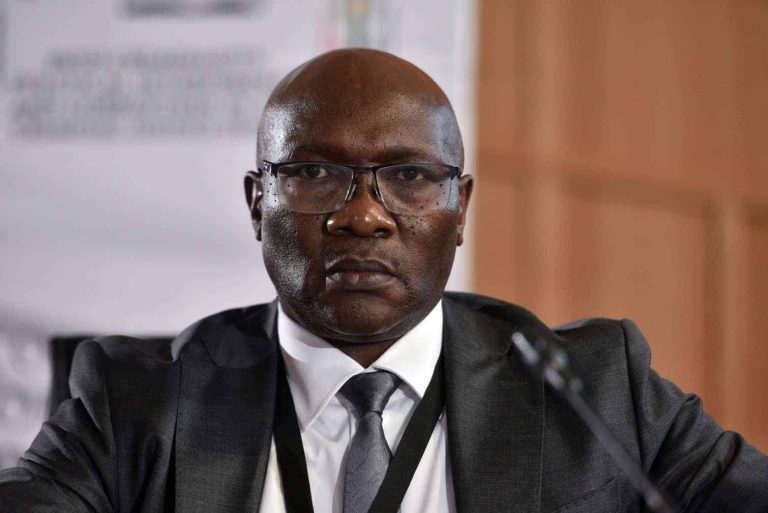
In a record-making achievement, Nigerian National Petroleum Company Limited (NNPCL), Sahara Group, Eroton E&P, and Bilton Energy Ltd have inaugurated Nigeria’s first wholly-owned 2.2 million-barrel capacity Floating Storage and Offloading (FSO) vessel, the first of such in the last 50 years of oil production in the country.
Designed to drive sustained oil and gas production, energy reliability, security, and sustainability across Nigeria, the vessel, according to the partners, is Nigeria’s first Crude Oil Terminal to be commissioned in 50 years.
The development was announced in a statement issued Wednesday by Chief Corporate Communications Officer of Sahara Group Limited, Mr. Bethel Obioma.
Christened Cawthorne, the FSO Terminal was described as a world-class facility designed to enhance crude evacuation from Nigeria’s oil mining lease (OML) 18 and nearby assets.
The OML 18 partners include NNPCL, Eroton E&P, OML Eighteen Energy Resource Ltd. (a Sahara Group Company) and Bilton Ltd.
The statement quoted Executive Vice President (Upstream), NNPC, Udobong Ntia, who represented NNPC Group Chief Executive Officer (GCEO), Bayo Ojulari, at the commissioning, to have said the achievement “is another bold achievement from the partnership between NNPC and its JV Partners that will guarantee seamless operations and bolster the strategic targets set by the President Asiwaju Bola Ahmed Tinubu towards ensuring optimised upstream production in Nigeria.”
Strategically stationed offshore Bonny, the statement explained that the double-hull FSO vessel with a storage capacity of 2.2 million barrels, represented a bold step forward in strengthening Nigeria’s crude export infrastructure and operational resilience.
The partners said the facility would receive, store, and offload crude oil to export tankers, providing a dependable solution to the logistical and infrastructural constraints that have long limited Nigeria’s crude evacuation capacity.
Cutting the tape to signal the official commissioning, NNPC Chief Upstream Investment Officer, Seyi Omotola, said the vessel represented a “renewed hope” for Nigeria’s upstream sector, adding that it also reaffirms the growing capacity of the nation to make its energy sector globally competitive.
Executive Commissioner, Development & Production, NUPRC, Enorense Amadasu, who represented Chief Executive of NUPRC, Gbenga Komolafe, said, “This is a commendable achievement that aligns with the vision of the NUPRC towards accelerating production in the nation, reliably, seamlessly, and sustainably.”
Amadasu added that Cawthorne FSO would enhance Nigeria’s export reliability and contribute to a more stable global energy supply chain, adding, “This is a critical step toward unlocking the full potential of OML 18 and other strategic assets in the region.”
According to Managing Director of Niger Delta Exploration and Production Offshore Limited (NEOL), Ibiyemi Asaolu, “This milestone showcases what is possible when innovation, collaboration, and execution excellence align. With FSO Cawthorne, we are not only securing production continuity from OML 18 but also contributing to Nigeria’s long-term energy infrastructure and revenue stability.”
Head, Commercial and Planning, Asharami Energy (a Sahara Group Upstream Company), Dr. Tosin Etomi, said, “The Cawthorne FSO stands as a symbol of innovation meeting necessity.
“It is not just a vessel, it’s an assurance of continuity, reliability, and value creation for our partners, our nation, and our people. This collaboration with the NNPC, NUPRC and other stakeholders embodies the drive to turn complex energy challenges into sustainable solutions that power progress across Africa.”
Etomi said the ultramodern vessel was fitted with digital capabilities that made it a vessel “built for the future, driving operational flexibility, reduction in carbon exposure from barge movements, and enhancing overall evacuation safety. It’s an investment in the resilience of the upstream sector and our environment.”
Etomi added, “The commissioning of FSO Cawthorne reaffirms Sahara Group’s and, indeed, OML 18 Partners’ commitment to powering progress responsibly through partnerships, innovation, and infrastructure that strengthen Africa’s energy independence.”
The statement said FSO Cawthorne project was conceived to address persistent challenges in Nigeria’s evacuation system, including limited barging capacity, delays in ship-to-ship transfers, and reduced vessel accessibility due to siltation at various berthing slots, which is much needed to support the assets’ 2025 exit volume of 50,000 barrels per day (bopd).
It said through this innovation, OML18 partners had created a more efficient, safer, and sustainable alternative that will reduce pipeline dependency and the risks associated with oil theft and vandalism.
The partners said conversion of Cawthorne vessel from a Very Large Crude Carrier (VLCC) into a fully integrated FSO unit was a feat of engineering excellence.
They stated that it included extensive modifications, state-of-the-art mooring systems, and cutting-edge import and export infrastructure, all designed in line with international maritime, safety, and environmental standards, such as IMO and MARPOL.
Fitted with a Marine Control System, they explained that the first and only FSO with such in the region, combined this technology with Artificial Intelligence to maximise fully automated import/export systems, PAGA, security, to list a few of the features.
The statement said, “The vessel can accommodate up to 50 personnel on board, offering a safe, secure, and comfortable environment for crew members and operations staff.
“Beyond its immediate operational benefits, the FSO serves as a scalable platform capable of accommodating future production increases and tie-ins from surrounding oil fields, further cementing its role as a strategic national asset.”
Peter Uzoho



